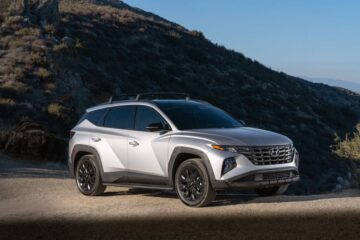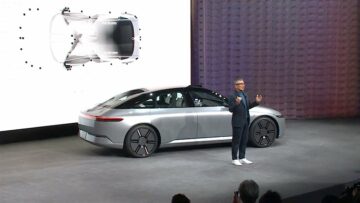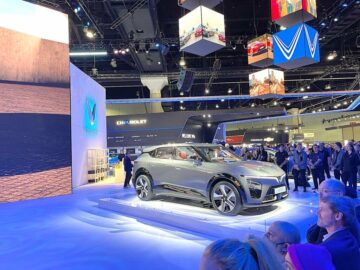Lucid reported fourth-quarter revenue of $26.4 million, and full-year revenue $257.7 million on Wednesday, falling short of Wall Street projections of $303 million. The company reported, it produced 7,180 Air premium electric sedans last year, above its forecasted production of 6,000 to 7,000 units, and delivered 4,369 units.
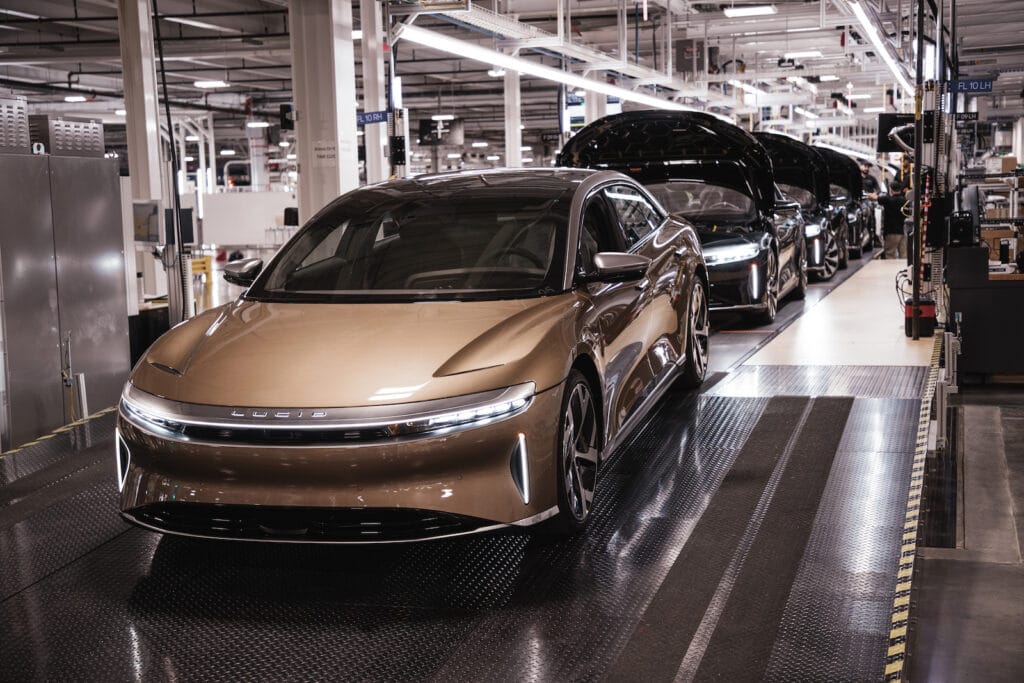
While Lucid’s press release sounds like good news, Wall Street is dissatisfied. Here’s why.
Digging deeper
Although Lucid anticipates producing 10,000 to 14,000 high-end electric vehicles in 2023, this is less than analysts’ projection of more than 20,000 vehicles, which led to a near 13% stock price decline in pre-market trading Thursday.
Yet more than just expectations are making people on the Street uneasy. As of Feb. 21, bookings totaled 28,000 units, down from the 34,000 units as of Nov. 8. This has led the company to stop publicizing its orders going forward, as if obfuscation will help their stock price. It won’t.
The company reported a 28-cent per share loss, less than the 64-cent loss per share a year reported a year ago. The company ended the quarter and the year with $500 million in available credit and $4.4 billion in cash, with the Public Investment Fund of Saudi Arabia having contributed $1.5 billion to the company during the fourth quarter, giving it a 62% stake in the automaker. This has fueled speculation the Saudi entity would buy the automaker, leading to the company’s stock price surge in January.

But the Street isn’t as impressed as those in the Middle East, with some analysts downgrading the stock.
While the company it has enough cash on hand to last until the first quarter of 2024, its negative earnings suggest it will need more cash before than to remain viable, with some suggesting it could be 2027 before the company realizes a free cash flow.
Major obstacles remain
Certainly, the company is facing the same challenges as other EV automakers.
The first is interest rates.
At its most recent meeting, Federal Reserve policymakers increased the interest rate by 0.25% to 4.75%. The hike follows six prior ones of as much as 0.75% each. Yet even though the latest rate increase is smaller, it’s still a raise.
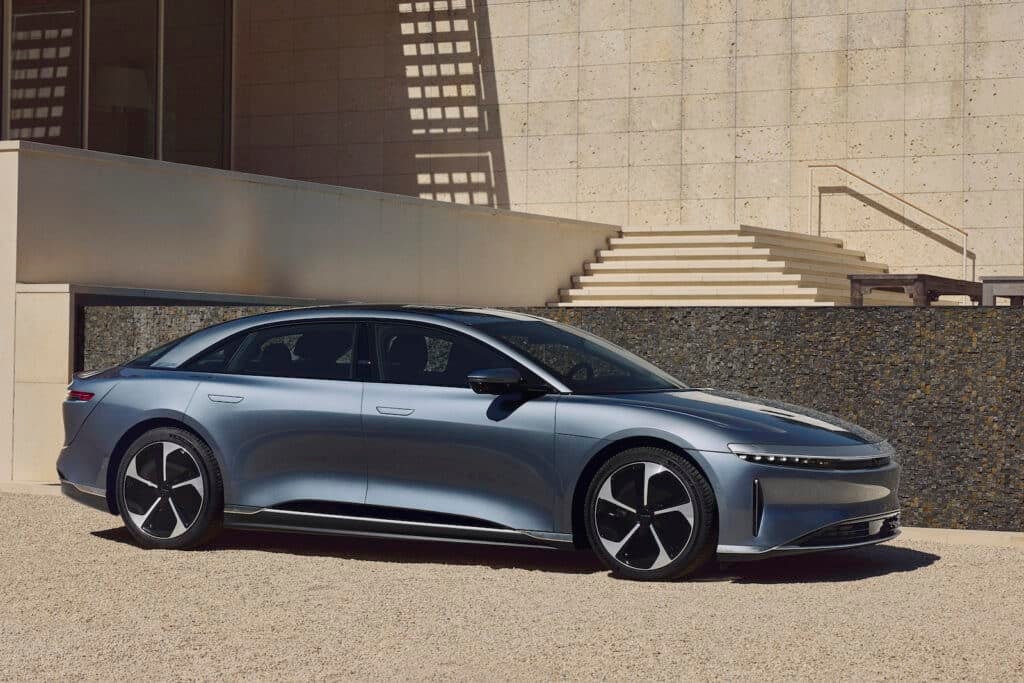
The Fed sees rates peaking this year, although when that might be remains unsaid. And although federal officials favor slowing the rate of increases, the auto industry is affected by each ratchet upward. Currently, according to Bankrate.com, a 48-month new car loan rate is 6.25%, while a 48-month used car loan rate is 6.88%. The fed’s increase could see these rates move higher.
In addition to higher interest rates, Lucid raised the price of the base Pure model in May by about $10,000, now starting at $89,050, while the Grand Touring jumped more than $15,000 to $155,650.
Nevertheless, both Tesla and Ford have cut the prices of their EVs, as the Inflation Reduction Act imposes price caps for its $7,500 Federal tax credit. Vehicles with an MSRP more than $55,000 for passenger cars and $80,000 for trucks and SUVs were not eligible in 2023. This has Wall Street worried, as a price could be on the horizon, one that’s already taking place in China.
The price war impacts all automakers, but Tesla least of all; it has some of the industry’s highest margins.
With Wall Street unconvinced that Lucid can yield a positive cash flow before running out of it, it remains to be seen how patient the Saudis will be, and whether they have the stomach to financially prop up Lucid’s continuing money-losing enterprise.
- SEO Powered Content & PR Distribution. Get Amplified Today.
- Platoblockchain. Web3 Metaverse Intelligence. Knowledge Amplified. Access Here.
- Source: https://www.thedetroitbureau.com/2023/02/lucid-reports-revenue-shortfall-points-to-better-2023/
- 000
- 10
- 2021
- 2022
- 2023
- 2024
- 28
- 7
- a
- About
- above
- Act
- addition
- AIR
- All
- already
- Although
- Analysts
- and
- Assembly
- auto
- automakers
- available
- base
- before
- Better
- Billion
- bookings
- buy
- caps
- car
- cars
- Cash
- cash flow
- ceo
- challenges
- China
- come
- company
- Company’s
- continuing
- contributed
- could
- credit
- Currently
- Cut
- Decline
- delivered
- down
- during
- each
- Earnings
- East
- Electric
- electric vehicles
- eligible
- enough
- Enterprise
- entity
- estimates
- EV
- Even
- expectations
- expected
- facing
- Falling
- falling short
- favor
- Fed
- Federal
- federal officials
- federal reserve
- financially
- First
- flow
- follows
- Ford
- Forward
- Fourth
- Free
- from
- front
- fund
- General
- Giving
- going
- good
- hand
- having
- help
- higher
- highest
- Hike
- horizon
- How
- HTTPS
- Impacts
- impressed
- in
- Increase
- increased
- Increases
- industry
- industry’s
- inflation
- interest
- INTEREST RATE
- Interest Rates
- investment
- investment fund
- IT
- January
- Last
- Last Year
- latest
- leading
- Led
- Line
- loan
- loss
- lucid
- Making
- margins
- max-width
- meeting
- Middle
- Middle East
- might
- million
- model
- more
- most
- move
- Near
- Need
- negative
- New
- news
- obstacles
- officials
- ONE
- orders
- Other
- patient
- People
- Peter
- Place
- plato
- Plato Data Intelligence
- PlatoData
- points
- policymakers
- positive
- Premium
- press
- Press Release
- price
- price surge
- Prices
- Prior
- Produced
- Production
- Projection
- projections
- public
- Quarter
- raise
- raised
- Rate
- Rates
- recent
- release
- remain
- remains
- Reported
- Reports
- Reserve
- revenue
- running
- same
- Saudi
- Saudi Arabia
- sedans
- sees
- Share
- Short
- shortfall
- SIX
- Slowing
- smaller
- some
- speculation
- stake
- Starting
- Still
- stock
- Stop
- street
- surge
- surpassed
- SUVs
- taking
- tax
- tax credit
- Tesla
- The
- their
- this year
- to
- touring
- Trading
- Trucks
- units
- upward
- Vehicles
- viable
- Wall Street
- war
- Wednesday
- whether
- which
- while
- will
- worried
- would
- year
- Yield
- zephyrnet





